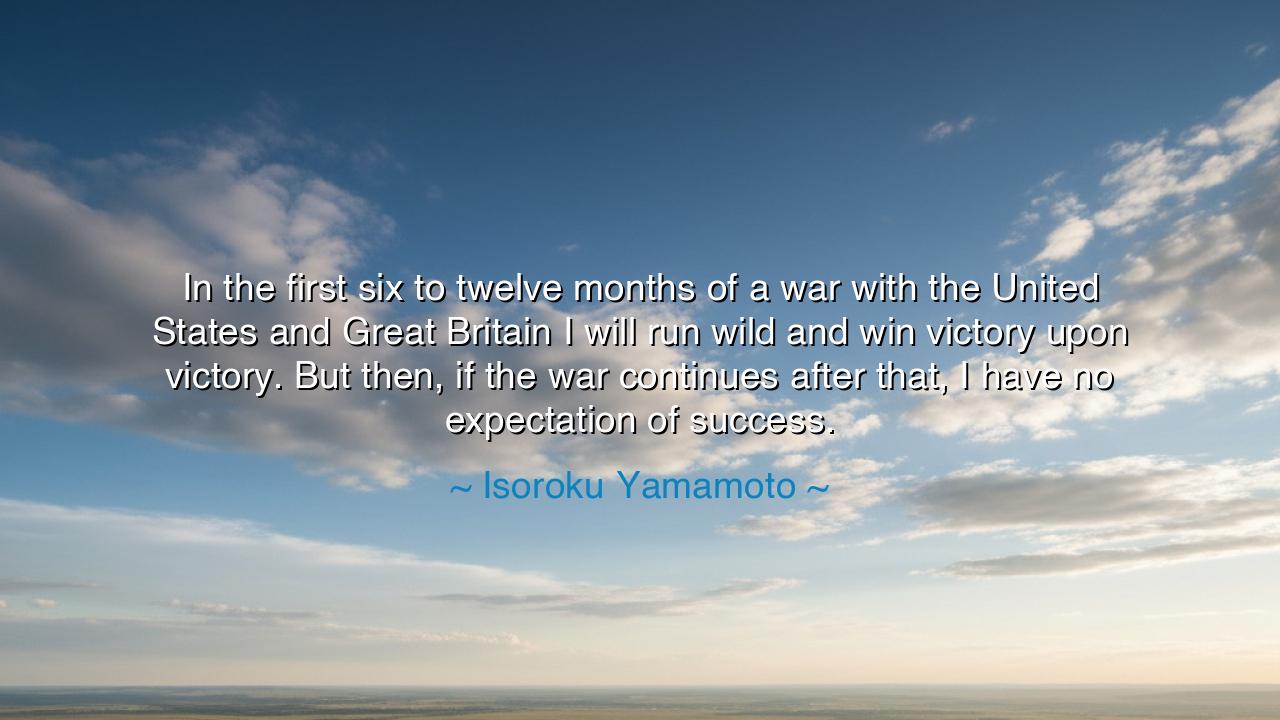
In the first six to twelve months of a war with the United States
In the first six to twelve months of a war with the United States and Great Britain I will run wild and win victory upon victory. But then, if the war continues after that, I have no expectation of success.






In the words of Isoroku Yamamoto, “In the first six to twelve months of a war with the United States and Great Britain I will run wild and win victory upon victory. But then, if the war continues after that, I have no expectation of success.” These are not the words of arrogance, but of foresight — a warrior’s lament disguised as prophecy. They carry the weight of both brilliance and sorrow, for in them speaks a man who knew the cost of war, who foresaw its flames consuming not only nations but the souls of those who fought. Yamamoto’s wisdom, drawn from both courage and clarity, reminds us that strength without restraint is like fire without boundary — dazzling for a moment, but destined to burn itself out.
The origin of this quote lies in the tense years before World War II, when Admiral Isoroku Yamamoto, commander-in-chief of the Imperial Japanese Navy, foresaw the folly of a prolonged conflict against the industrial giants of the West. Though a loyal servant of Japan, he was a reluctant warmonger. He had studied in America, had walked its cities, seen its factories, and understood the vast power of its people. He knew that Japan could strike swiftly — like a sword from the shadows — but that its blade would dull long before the enemy’s spirit broke. His words, spoken to Japan’s leaders before the attack on Pearl Harbor, were a warning shrouded in loyalty: that though the storm might begin in triumph, it would end in ruin.
The meaning of Yamamoto’s warning stretches beyond the battlefield; it is a truth that echoes through the ages: victory without vision is hollow, and passion without patience is perilous. Many can win the first strike, but few can sustain the long struggle. For in every endeavor — whether in war, politics, or life itself — the first triumphs often deceive. They intoxicate the spirit, make men blind to limits, and turn wisdom into pride. Yamamoto saw this clearly. He knew that Japan’s initial victories — in the Pacific, in the air, across the sea — would be dazzling, but unsustainable against the relentless tide of American industry and will. It was as if he could already see the long shadow of Midway, the crumbling of Japan’s fleet, and the weary faces of a nation undone by its own overreach.
History proved his prophecy true. In the first months of war, Japan struck fear into the world. Its forces conquered swiftly — Pearl Harbor, Singapore, the Philippines, the Dutch East Indies — each a glittering triumph. The empire “ran wild,” just as Yamamoto had said it would. But after that brief blaze, the tide turned. The Battle of Midway in 1942 became the turning point — Japan’s carriers destroyed, its power diminished. The empire that had once burned so brightly began to fade into ash. Yamamoto’s vision had not been the boast of a conqueror, but the sorrow of a seer. He understood that wars are not won by speed alone, but by endurance — not by glory, but by wisdom.
His insight mirrors the lessons of the ancients. The Chinese strategist Sun Tzu, centuries before, warned that “there is no instance of a nation benefiting from prolonged warfare.” The Roman general Hannibal, too, after his glorious victories against Rome, learned that early triumphs cannot outlast the will of a disciplined enemy. Yamamoto, like these sages of old, saw that in the long game, it is not fire that wins — it is steel, tempered through time, sustained by patience, and guided by humility. The swift flame may dazzle, but the enduring ember shapes the future.
The lesson, then, is clear: in all human striving, beware the intoxication of the early victory. Whether in war, ambition, or creation, the first rush of success can be a trap. It fills the heart with pride and blinds the mind to the endurance required for the long road ahead. The wise must remember Yamamoto’s foresight — that true victory lies not in speed, but in sustainability; not in the first charge, but in the strength to persist when passion fades and hardship endures. The mightiest warriors are not those who strike the hardest, but those who last the longest.
And so, my children of the present age, remember this: when you begin any great endeavor — a dream, a battle, a cause — rejoice not only in your first triumphs, but prepare for the long struggle that follows. Let Yamamoto’s warning echo in your heart: do not mistake the blaze of the moment for the light of eternity. Build your strength wisely, respect your limits, and wage your wars — literal or metaphorical — with clarity of purpose and humility of spirit. For the truest power is not in running wild, but in knowing when to endure, and when to seek peace.
Thus, the admiral’s words live beyond the war that claimed him. They are a testament to vision — the wisdom to see beyond the first horizon of victory and to recognize that no force, however fierce, can conquer forever. He reminds us that the measure of greatness is not how brightly one burns, but how wisely one shines.






AAdministratorAdministrator
Welcome, honored guests. Please leave a comment, we will respond soon